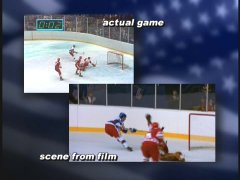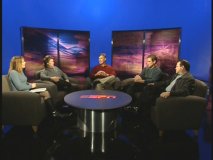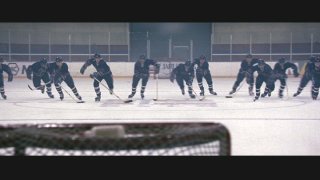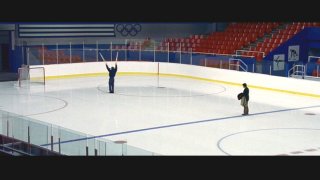Miracle DVD Review
 |
Miracle Theatrical Release: February 6, 2004 / Running Time: 136 Minutes / Rating: PG Director: Gavin O'Connor Cast: Kurt Russell (Herb Brooks), Patricia Clarkson (Patty Brooks), Noah Emmerich (Craig Patrick), Sean McCann (Walter Bush), Kenneth Welsh (Doc Nagobads), Eddie Cahill (Jim Craig), Patrick O'Brien Dempsey (Mike Eruzione), Michael Mantenuto (Jack O'Callahan), Nathan West (Rob McClanahan), Kenneth Mitchell (Ralph Cox), Eric Peter-Kaiser (Mark Johnson), Bobby Hanson (Dave Silk) |
Buy Miracle from Amazon.com: Blu-ray + DVD • DVD • Blu-ray • Instant Video
With an apt balance of game reenactment, heavy preparation, and a touch of personal moments, Kurt Russell, the star of nearly a dozen Disney films in the late '60s and early '70s, makes a momentous but probably momentary return to family-friendly fare. Russell takes the lead role of Herb Brooks, the University of Minnesota coach who was appointed head coach of the Olympic team. It is a noteworthy reunion of the actor and Disney films, even if Miracle is a far cry from Russell's Dexter Riley movies and other wacky comedies. Russell gives a winning performance and is the heart and soul of the film.
Coach Brooks has a distinct vision for the US team to not get embarrassed in the international competition, and it involves some unorthodox manuevers, from putting together a roster which overlooks some of the best players to making a point to distance himself from his team.
Brooks' method also involves intense physical conditioning, perhaps to the point of madness. One of the film's most memorable scenes shows Brooks making his players do line drills on the ice "again" and "again", even after the arena's lights have been turned off. The scene goes too far to make the point, but then Brooks probably did, too.
Miracle faces a problem that any sports movie, particularly one based on a true story does, of developing the characters of a teamful of athletes. Unlike a film like Major League, which can quickly setup and use a diverse group of wacky personas, Miracle tries to remain true to the real players, which makes it difficult for us to keep track of who's who.
Even if you are able to keep track of characters, it may likely be with unspoken names of "Mustache Man" and "Pretty Boy." You'll probably want to stay away from "Sideburns," as there's at least ten players who fit that description. Of course, if you were one of those who followed this Olympic run, the names may mean something to you.
Nonetheless, we don't get more than a glimpse of any players, save for maybe three. But then, this is the story of a team, or as Brooks puts it, "the name on the front of the jersey is a hell of a lot more important than the one on the back." Brooks stresses the importance of "team" repeatedly and even refuses to let players speak to the press. All the same, the team comprised of amateur athletes from all over the country has the attention of the press as it marks out on an unprecedented string of victories, all coming from behind.
Though its real life inspiration is considerably more known, Miracle follows the sports film formula of Remember the Titans to a T. While there is no doubt that much of Disney's young audience will be unfamiliar with the story, filmmakers do stay close to the facts.
You may very well know the story of the team, and being 1980, the mentality that more than hockey is at stake as the US starts to look towards facing the team-to-beat and reigning champion Soviet Union team. Cultural elements and "the Cold War" are touched upon in the film, but at the forefront is hockey. There's just something about Miracle that doesn't quite add up to the excellent film it should be, with its strong story and central performance. The seemingly obligatory scenes of Brooks ignoring his wife (Patricia Clarkson) and children call to mind The Rookie and the scenes of the team bonding may remind of Remember the Titans. Noah Emmerich as the assistant coach and the man in-between Brooks and his athletes, does little more than passively question Brooks' tactics and then with a nod and a smile, see their value. Nonetheless, as formulaic as Miracle may seem, it still manages to engage. I won't go as far as to say it's inspiring, but even those without a passion for hockey (such as me) will find some things to like about the film. VIDEO and AUDIO
Miracle is presented in its original aspect ratio of 2.35:1, and has been enhanced for 16x9 televisions. The video is flawless. The colors are bright and accurate. The picture is sharp and vibrant. Fleshtones and black levels are perfect, the whites of the rink do not bloom or bleed. There is depth and clarity, and not a single imperfection that I could pick up. Though it's not surprising that such a recent film looks this good, it's very satisfying, all the same.
Presented in Dolby Digital 5.1, the film also merits the highest scores for audio presentation. Dialogue, music, and sound effects are all clearly and accurately defined. It's clear from the bonus material on sound design that much effort went into the mix, and this mix is wonderfully represented on DVD. Surrounds come into effect to help create an intense on-ice environment, with skates moving in every direction. The track is also able to more subtly support the human drama of the film, with its presentation of the score. There is absolutely nothing with which to find fault with the film's presentation on this DVD.
EXTRAS
There are two bonus features on Disc 1. First is "The Making of Miracle", an 18-minute documentary. A significant portion of this deals with casting. The director's search for hockey players who could act presented a challenge for the casting department. Extensive training made sure the actors were in shape to make the hockey scenes look real. Director Gavin O'Connor wanted Russell to shed his image altogether and become Herb Brooks. The filmmakers put painstaking effort to remain accurate to the real games and players. Footage from the actual game against the Soviet Union is compared to footage from the film. The featurette also discusses the heavy editing process required since so much footage was required. Among those interviewed are ABC sports announcer Al Michaels, composer Mark Isham. There's also some footage from the film's February premiere at El Capitan theater.
Second is an audio commentary by director Gavin O'Connor, Editor John Gilroy, and Director of Photography Daniel Stoloff. It's a mix of discussion on the technical and dramatic intentions of the film, with an emphasis on the former. There's some brief mention of deleted footage, which is disappointingly not included on either disc. It's not the most exciting commentary, but those who are interested in hearing the director's thoughts should be pleased.
Disc Two opens with "From Hockey to Hollywood" (27:28), which repeats a little bit from the first disc's "Making of", but goes into greater detail on the atypical casting process. Very little of the cast had acting experience, and the auditions were primarily like hockey tryouts. Five actors are profiled: Patrick Brian Demsey, Eric Peter-Kaiser, Nathan West, Eddie Cahill, Michael Mantenuto, and Billy Schneider who portrays his father Buzz. We see clips of the cast auditioning on ice, the players training for the movie, and hear how much they resemble the team members they're portraying. There are cast audition interviews, and this piece also ends with the premiere, when the cast and the real Olympic team were all reunited.
"Miracle" ESPN Roundtable with Linda Cohn plays like it sounds for 41 minutes. This special, which originally aired on ESPN Classic, puts the network's Cohn as host to a discussion with Kurt Russell and members of the 1980 Olympic hockey team Mike Eruzione, Buzz Schneider, and Jim Craig. There is a nice, comfortable tone to this conversation. The team members bring their perspective of playing for Herb Brooks, and understanding the method to his madness that led to a Gold Medal. Russell brings to the table his experience in making the movie and meeting Brooks in 2003. It's an interesting feature, with a mix of information on the movie and the real-life inspiration.
Most poignant is the discussion on the "Herbies", the full-rink skating drills. The scene in the film, as stated above, one of the most memorable, is the result of several days and actual filmed conditioning. The real team members recall the time when Brooks made the team run them again and again; 2 of the three managed to get out of it. The players also reflect on Brooks' intensity and willingness to put up a wall between him and his players, all for the point of winning.
Late in, the piece turns a bit into a forced opportunity for Russell to talk about the film for the Disney-owned cable channel's audience. To its benefit, Russell does lend some insight into his attempt to immerse himself in the character of Brooks.
"The Sound of Miracle" (10:20) explores the film's sound design. Despite the nature of the topic, the featurette avoids being dry or simply a retread of other DVDs' sound design featurettes. The featurette explains how the film's soundtrack goes through various stages, and a demonstration reel presents scenes with only one of the tracks active. There's just Production Sound, just ADR (Automatic Dialogue Replacement), just skate sound effects, just boards/glass sounds, just crowd effects, etc., etc.
Director Gavin O'Connor introduces "First Impressions: Herb Brooks with Kurt Russell & The Filmmakers" (21:10) and says it is presented on DVD as a tribute to the man at the center of the story. Here, he talks about a variety of subjects, including the Soviets, players' haircuts, being cut from the Olympic team and having to cut players. Very often, Brooks has the filmmakers laughing. Though each section of this is given a title screen and chapter, there is no chapter menu, so you'll just have to skip, if you are inclined to use chapters. In spite of this and the understandably poor video quality, it's a really valuable bonus feature that sheds light on the man and the film.
Outtakes (4:50) is a reel showing actors flubbing lines, cracking up, and fooling around on the set. I always find outtakes pretty interesting to see, even if they're not overly hilarious.
Individually, the extras all leave a bit to be desired. But altogether, they do cover various aspects of the film and the true story in a fairly interesting fashion. The lack of the film's memorable theatrical trailer is disappointing, but not surprising. What is more noticeably absent is a feature (or even a mention) on Kurt Russell's past with Disney. In fact, the star of the movie is given little coverage in the DVD extras, but perhaps that's by his choice.
Disc One's menus are animated 16x9 screens accompanied by score and sound effects from the film. The theme of Disc 1 is Coach Brooks watching game footage on his projector. Disc Two's menu opens as if it's a special feature in progress, and when you make a selection, it briefly appears that the feature is going, but it's just the unusual menu, with Coach Brooks writing plays on the glass for his team.
Disc One opens with previews for Aladdin, Around the World in 80 Days, Confessions of a Teenage Drama Queen, and The Three Musketeers starring Mickey, Donald, and Goofy. From the Sneak Peeks menu, there are also trailers for The Lion King II: Simba's Pride (Special Edition), and Teacher's Pet, plus ads for ABC Sports, ESPN's 25th Anniversary, and ESPN NHL Hockey video game. Also included on Disc 1 are the THX Optimizer tests designed to calibrate your video and audio systems.
CLOSING THOUGHTS
Both the movie and the DVD extras are well above average, but leave a bit to be desired by me. Still, the audio/video presentation of the film is flawless, and the 2-disc set is filled with substance, not fluff. Miracle is a journey that many will enjoy taking, especially those who fondly remember the 1980 Winter Olympics.
Buy Miracle from Amazon.com: DVD / Blu-ray + DVD / Blu-ray / Instant Video
|
Related Reviews
DVDizzy.com | Reviews | Recent Live Action Disney Movies | DVD & Blu-ray Schedule | Upcoming Cover Art | Search
DVDizzy.com Top Stories: Reviewed May 12, 2004.
The Mighty Ducks • The Rookie • Cool Runnings • Remember the Titans (Director's Cut)
Invincible • The Greatest Game Ever Played
Also starring Kurt Russell:
Follow Me, Boys! (1966) • The Computer Wore Tennis Shoes (1969) • The Barefoot Executive (1971) • Now You See Him, Now You Don't (1972)
The Strongest Man in the World (1975) • The Fox and the Hound (1981) • Sky High (2005) • The Art of the Steal (2014) • The Hateful Eight (2015)















